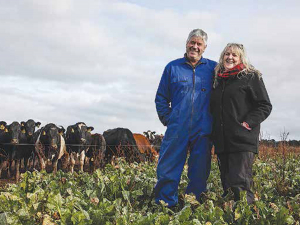Come and chat to the DairyNZ team
DairyNZ's team is looking forward to catching up with Southland and Otago dairy farmers at the Southern Field Days in Waimumu near Gore next month.
 Southland farmers Ewen and Diane Mathieson have experience in wintering well to protect their stock and the environment.
Southland farmers Ewen and Diane Mathieson have experience in wintering well to protect their stock and the environment.
Farmer Ewen Mathieson is working hard to protect their stock and the environment by wintering well during the coldest months of the year.
Traditionally, July brings chilly temperatures, wet weather and an increased risk of snow. To help farmers stay on top of these challenging conditions, Southland dairy farmer Ewen, shares his experiences of managing winter grazing.
Speaking on a DairyNZ podcast, Mathieson agreed that planning ahead, developing contingency plans, and carrying out daily checks are key to providing good animal care, protecting the environment and minimising stress for people and animals over winter.
“Having a wintering plan helps identify risks like slopes, water sources, and different soil types which helps us to plan our winter grazing to reduce the risk of contaminant and sediment runoff,” he says.
“Planning allows us to think through the different scenarios that could occur over winter and prepare for them. It helps reduce stress and allows you to get a better night’s sleep,” adds Ben.
Mathieson has developed small sawdust pads on his farm to provide cows with a comfortable space to move to, and lie on, in bad weather.
“Cows need to be able to lie down while they are digesting feed,” he says.
“They need to express their natural behaviours and lying is an important part of this.”
Mathieson says a particular focus on his farm is checking animals regularly – once or even twice daily.
“This helps us catch issues early so that small issues don’t escalate into bigger problems.”
DairyNZ’s head of the South Island, Tony Finch, says during July and August the weather can be very cold and unpredictable, and farmers need to keep up their focus on caring for stock right to the end of winter.
“Daily checks on the weather forecast, paddock conditions and cows are all vital to protect your herd. You can use the gumboot test to check that the ground is suitable for cows to lie on. Planning ahead is also key to ensure that cows don’t calve on mud.”
Last winter, 89% of farmers developed a contingency plan to protect their animals and the environment in bad weather.
Finch says it’s not too late for farmers to develop a Plan B if adverse weather strikes, using DairyNZ’s template.
“If you do have a Plan B, check your team understand when to action it.”
To listen to the new podcast, access the gumboot test, and other wintering advice visit www.dairynz.co.nz/wintering, or visit www.beeflambnz.com/wintergrazing for wintering resources.
Coming in at a year-end total at 3088 units, a rise of around 10% over the 2806 total for 2024, the signs are that the New Zealand farm machinery industry is turning the corner after a difficult couple of years.
New Zealand's animal health industry has a new tool addressing a long-standing sustainability issue.
The Government has announced that ACC will be a sponsor of this year's FMG Young Farmer of the Year competition.
As veterinary student numbers grow to help address New Zealand's national workforce shortge, Massey University's School of Veterinary Science is inviting more veterinary practices to partner in training the next generation of vets.
South Island dairy farmers will soon be able to supply organic milk to Fonterra.
Norwood has announced the opening of a new Tasman dealership at Richmond near Nelson next month.
OPINION: There will be no cows at Europe's largest agricultural show in Paris this year for the first time ever…
OPINION: Canterbury grows most of the country's wheat, barley and oat crops. But persistently low wheat prices, coupled with a…